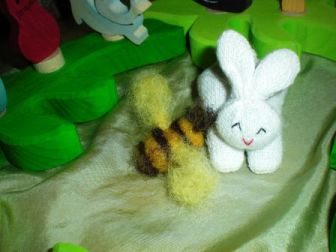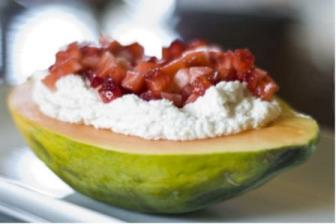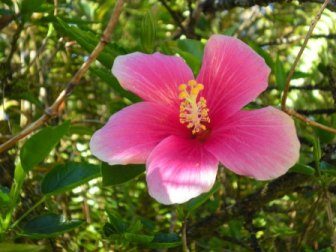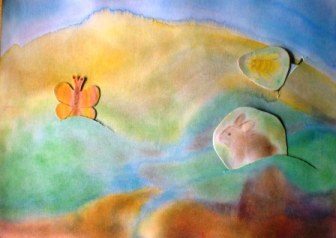Pamela Perkins, who resides in Hawaii, created this small festival and offered to share it with the LifeWays community. Enjoy!
Wandering in the Meadow
A Springtime Mini Festival
I created this simple festival for my 4- and 6 year-old granddaughters and a few friends to celebrate springtime. I chose (with some poetic license) to incorporate a few cultural elements from our shared New England and local experiences, which lent a Japanese, American and Hawaiian flavor to the celebration.
The children and adults gathered into a circle as I sang one of the numerous songs I have used for many years to bring a circle together. I had prepared the center space with a large sward of green silk gauze, and a basket with props where I would sit. After we all sat down, I began to play the following, first just with the lyre, then again, adding singing.
“Usagi” (“Rabbits,” from the Japanese) *
U-sa-gi, U–sa–gi E-E-G, B-A-B
Na-ni mi te ha ne ru? E-E G A B A B ?
J-u-go-ya o tsu-ki sa-ma D-D-B-A G A-A G-E
Mi –te ha-a-a ne-ru ! G-E G-A-G E-E !
I welcomed everyone with aloha (a-lo-ha = I perceive in you your ‘ha’, or spirit breath) and shared a few words about new life and the renewal forces we feel in springtime, even if more subtly here on the island. I mentioned how nurturing and delightful it is for us as adults to see the world afresh through the eyes of our children and grandchildren, as well as healing to continually enliven our own childlike sense of wonder.
 Story Bridge
Story Bridge
As I spoke I gathered the edge of the silk in front of me slowly up and over my lap. My granddaughters, who had shared this circle with me for about a week or so at this point, followed my prompt and did likewise. With perhaps a nudge or two, they let the grownups next to them know that they should follow suit. I passed around the basket with bunny puppets for each child and butterfly puppets for the adults. My granddaughters also took out their other story helpers and tucked everything underneath the silk on their laps.
“When I was visiting my other two granddaughters in Northern Vermont last summer, I loved to wake with the sunrise each day and walk through the open fields, watching the cows lumber slowly out to pasture as the night mists slowly lifted their veils to make way for the greening of the day. As I sat on an outcropping of granite, I spotted several wee bunnies come tentatively out into the open, their pink noses twitching. We viewed each other with curiosity before they hoppity-hopped away, probably back to their mamma. Now here is a story about some other little bunnies that goes like this…”
Wandering in the Meadow Puppet Story **
(As I spoke, one granddaughter brought her bunny out from under the silk)
Wandering in the meadow
What did I see?
A little brown bunny
Looking back at me!
I stood quite still
So she wouldn’t run away
And whispered very softly:
‘Would you like to come play?’
‘Thank you,’ said she.
‘I would love to stay,
But I must go home now.’
Then she hopped away.
(The second bunny now appears)
Wandering in the meadow
What did I see?
A little brown bunny
Looking back at me!
I stood quite still
So she wouldn’t run away
And whispered very softly:
‘Would you like to come play?’
But she just twitched her ears
And wriggled her nose
Then hopped on away
On her little furry toes.
I then spoke: “When those bunnies reached the edge of the woods, they heard their mommy calling them: Thump! Thump! Thump! (I thumped the floor next to me with the flat of my palm, as did the children) After they got home, they washed their paws, nibbled their snack, then snuggled into their warm soft nest and fell fast asleep.” I hummed ‘Usagi’ softly, as I slowly tucked my bunny under the silk and then gently patted it where it nestled in the green with just its nose peeping out; the children followed suit. I continued to speak. The adults imitated me as I moved my butterfly puppet, see below. My granddaughters were the bees.
And so, I went on walking
Through grasses sweet and fair
While busy insects flew on by
Through the warm spring air.
Oh, butterflies, bright butterflies!
Like floating feathery flowers!
Swoop! Swirl! Settle softly…
Then, Flutter-flit! Flit-flutter!
Windborne, and away!
Little buzzing busy bees
Zzipping here! Zzipping there!
Gathering pollen to make honey
For their hives and us to share!
Slowly on an ocean breeze
Like grey and fluffy sheep
Clouds began to gather
And bunch up in a heap.
Then raindrops came pitter-pattering
Down upon my head
It’s time to skip back home
For some honey, fruit and bread.
Goodbye bunnies!
Goodbye bees!
Goodbye butterflies!
Goodbye all three!
We had taken off our finger puppets and tucked them under the silk when the ‘rain’ came down. We stood up, held hands as we walked around the circle once, while singing the simple pentatonic song below, then I released my older granddaughter’s hand and she lead us into the bathroom to wash up.
Off we go, to and fro,
Not too fast and not too slow!
Time to wash our hands then eat!
Sharing snack is such a treat!
 Hand Washing Verse
Hand Washing Verse
Splish! Splash! Quick as a flash!
The soap slides in!
Hands dive, swish, swish,
Catch the little sudsy fish!
Then smooth and slow
Round it goes, o’er
Tops and bottoms, in between
Now every finger’s nice and clean.
Next to dry them, one, two, three,
Then to the table follow me!”
Singing again:
“Here we go, to and fro,
Not too fast and not too slow.
Time to come and take a seat
Sharing snack is such a treat!”
We sat at the simple but beautifully laid table bedecked with flowers from the yard.
Candle -lighting Song:
“Here comes a spark of sunshine bright!
See how it brings us golden light!”
Meal blessing, sung:
“Earth Who Gives to Us Our Food”
Spoken: “Blessings on our mealtime, and on each other, too” (holding hands)
Snack:
Bunny and butterfly shaped whole grain bread (cut out ahead of time with cookie cutters)
Hawaiian honey, organic butter
Local organic seasonal fruit
Sun-tea or just water
Meal closing
Spoken:
“Thank you for our food and for each other, too.” (holding hands)
“Goodbye dear spark of golden light
Thank you for shining so warm and bright! ” (candle gently snuffed)
 Transition to Activity:
Transition to Activity:
“Let us go a walking now:
Soon bunnies we shall see –
Maybe brown or tan or white
To hop and play with me!”
Craft Activity: Washcloth bunnies and wooly nests
Materials
Thin cotton washcloths (tan, cream and dark brown)
Elastics
Embroidery floss
Narrow colored ribbon for necks
Natural and colored wool to finger fluff for nests from Honoka’a sheep (a town up on the northern part of the Island)
Needles/ pincushion
Scissors
Closing
Goodbye Song:
“Dear friends, goodbye… Mahalo, Aloha, A Hui Hou! (Thank you, aloha/goodbye, see you again!)
* Footnotes:
Usagi (Rabbits)
The lyrics are traditional; I altered the tune for use on my pentatonic lyre; however, the phrasing remains true to the original rhythm. I chose the song because of its bunny theme, even though it is traditionally sung in Japan around the time of the Harvest moon in September, when the air tends to be clearest, the weather most benign and many fruits are ripe. Offerings of sweets, fruits and a vase of pampas grass may be made as offerings to the moon. A Japanese legend tells that restless domesticated bunnies like to run away on the night of the full moon!
Rough translation:
Hippity, hoppity, Rabbit, tell me what you see?
The Moon, the old harvest Moon, hippity hoppity.
Another Japanese legend explains that there is a rabbit in the moon, who pounds sticky rice into mochi (small, chewy rounded dumplings). Our Japanese-American community and the local Buddhist churches sponsor mochi-making events in preparation for the New Year. Mochi is also enjoyed throughout the year, in plain, bean-filled or sometimes quite elegant and exotic forms.
Here on the east side of Hawai’i Island, we love to watch the full moon whenever it is not raining or cloudy, which can require some patience, as our weather is very wet! The ancient Hawaiians were spectacular navigators, perhaps among the best in the world. Not only did they have a deep understanding of the ocean and the current, but also of the stars and the movement of the moon. Each lunar phase (30 days) has a specific name in Hawaiian and indicates what activities should be conducted or refrained from each day.
